|
|
What Are Diabetes Problem?
Too much sugar in the blood for a long time causes diabetes problems. This high-blood sugar can damage many parts of the body, such as the heart, blood vessels, and kidneys. Diabetes problems can be scary, but there is a lot you can do to prevent them or slow them down.
Will I Have Diabetes Problem?
|
Maybe. You may have one or more diabetes problems or none at all. It is hard to know if or when your diabetes will cause problems. If you have diabetes when you are young, you may not have diabetes problems for many years. If you find out you have diabetes as an adult, you may already have diabetes problems. Either way, keeping your blood sugar under control can prevent diabetes problems. |
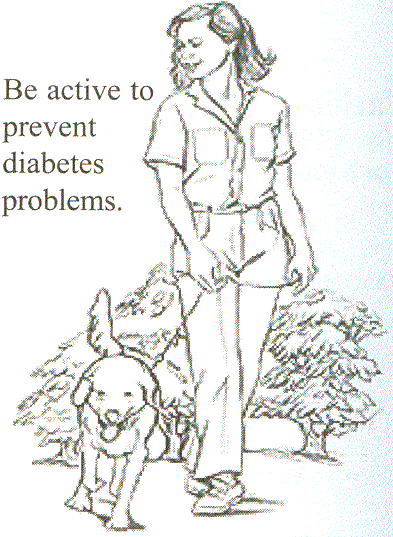
|
What Should My Blood Pressure Number Be?
For most people, good blood sugar levels are
| On waking up (before breakfast) | 80 to 120 |
| Before meals | 80 to 120 |
| 2 hours after meals | 180 or less |
| At bedtime | 100 to 140 |
Ask your health-care provider what your blood sugar numbers should be.
| On waking up (before breakfast) | ______ to ______ |
| Before meals | ______ to ______ |
| 2 hours after meals | ______ or less |
| At bedtime | _______ to ______ |
You and your health-care provider will agree on when to check blood sugar using a blood glucose meter. You will do the tests yourself. Be sure to ask your health-care provider to teach you how to use the meter.
Keep track of your blood sugar using the record page. Print out the record page or ask your health-care provider for a blood sugar record book. Your blood sugar check results will help you and your health-care provider make a plan for keeping your blood sugar under control.
How Can I Find Out What My Average Blood Sugar Is?
|
Ask your health-care provider to do a hemoglobin A–1–c (HE–moh–glow–bin A–1–c) test. This blood test shows the average amount of sugar in your blood during the past 3 months. Have this test done at least twice a year. Your health-care provider uses this test plus your blood glucose meter test results to tell if your blood sugar is under control. |
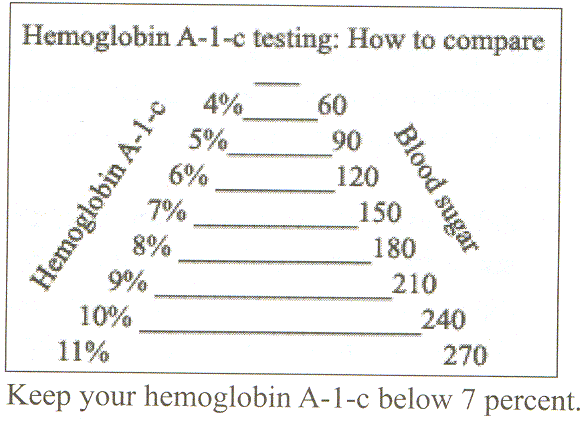
|
Aim for a score of less than 7 percent. If your test result is less than 7 percent, then your blood sugar is in a good range and your diabetes treatment plan is working. You are doing all you can to prevent diabetes problems.
A test result of more than 8 percent is too high. At more than 8 percent, you have a greater chance of getting diabetes problems, like kidney damage, and you need a change in your diabetes plan. Your health-care provider can help you decide what part of your plan to change. You may need to change your meal plan, your diabetes medicines, or your exercise plan.
|
Check Your Hemoglobin Alc I.Q.
Find out how much you know about the hemoglobin A1c test (also called H-b-A-1-c). Mark each statement true (T) or false (F). Then see how you did by checking the correct answers and explanations on the bottom of this page.
Answers to the Hemoglobin A1c I.Q. Quiz
|
What Should I Do About Blood Pressure?
| Normal blood pressure will help prevent damage to your eyes, kidneys, heart, and blood vessels. Blood pressure is written with two numbers separated by a slash. For example: 120/70. The first number should be below 130 and the second number should be below 85. Keep your blood pressure as close to these numbers as you can. | 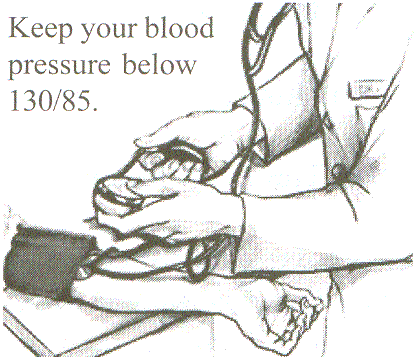
|
If your blood pressure is too high, your doctor might ask you to take a blood pressure medicine called an ACE inhibitor (in–HIB–it–ur). This type of blood pressure medicine is best for people with diabetes.
What Should I Know and Do About Smoking?
| Do not smoke. Smoking
slows down the blood flow and can make heart and blood vessel problems
worse. Smoking can slow blood flow to your feet and legs and make
sores and infections harder to heal.
If you smoke, ask your health-care provider for help in quitting. |
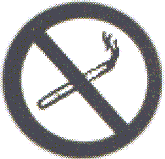
|
What Else Can I Do to Prevent Diabetes Problems?
| There are other things that you can do either each day or one or more times a year to prevent diabetes problems. For example, to keep your feet healthy, you should check them each day. To keep your eyes healthy, once a year you should have drops put in your eyes and have them examined. | 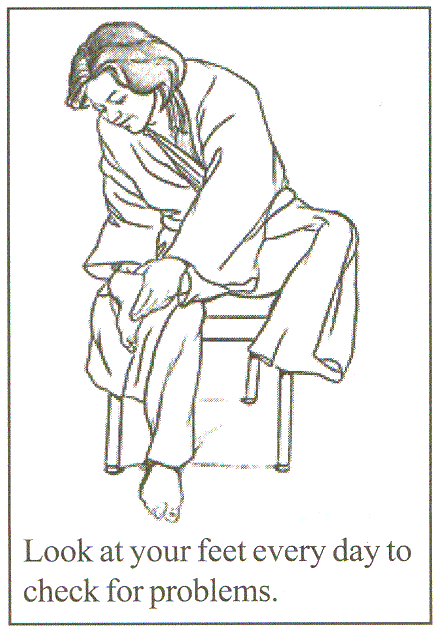
|
Things to Check For Good Diabetes Care
Taking care of diabetes is a team effort between you and your health-care provider team (doctor, diabetes nurse educator, diabetes dietitian educator, pharmacist, and others). You are the most important member of the team.
Take charge of your diabetes care by learning what to do for good diabetes care:
|
Things to do every day for good diabetes care. | |
|
Things for your health-care provider to look at every time you have a checkup. | |
|
Things for you or your health-care provider to do at least once or twice a year. |
Keep a daily record of blood sugar test results. (Print out the daily diabetes record page.) This information will help you see if you are reaching your blood sugar goals. Y ou can prevent or slow down diabetes problems by reaching your blood sugar goals most of the time.
Things to do everyday for good diabetes care

|
Follow the healthy eating plan that you and your doctor or dietitian have worked out. Eat your meals and snacks at around the same times each day. |

|
Be active a total of 30 minutes most days. Ask your doctor what activities are best for you. |

|
Take your diabetes medicine at the same times each day. |
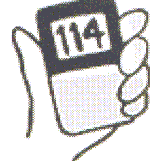
|
Check your blood sugar every day. Each time you check your blood sugar, write the number in your record book. Call your doctor if your numbers are too high or too low for 2 to 3 days. |

|
Check your feet every day for cuts, blisters, sores, swelling, redness, or sore toenails. |

|
Brush and floss your teeth
and gums every day.
|

|
Don’t smoke. |
Things for your health-care provider to look at every time you have a checkup:
|
Your blood sugar records • Show your records to your health-care provider. • Tell your health-care provider if you have low blood sugar or high-blood sugar often. |
|
Your weight • Ask your health-care provider how much you should weigh. • Talk about ways to reach your goal that will work for you. |
|
Your blood pressure • A good goal for most people is less than 130/85. • Ask your health-care provider about ways to reach your goal. |
|
Your diabetes • Talk to your health-care provider medicines plan about any problems you have had with your diabetes medicines. |
|
Your feet • Ask your health-care provider to check your feet to make sure your foot nerves and your blood circulation are OK. |
|
Your plan for exercise • Tell your health-care provider what you do to stay active. |
|
Your meal plan • Talk to your health-care provider about any problems Ask questions about what to eat, how much to eat, or when to eat. |
|
Your feelings • Ask your health-care provider Are you tense . about ways to handle stress or depressed? • If you are feeling sad or unable to cope with problems, ask about how to get help. |
|
Your smoking • If you smoke, quitting may be very hard to do. But your health-care provider may be able to help. |
Things for you or your health-care provider to do at least once or twice a year:
| Hemoglobin A–1–c lab tes t | Have
this blood test at least twice a year.
This will tell you what your average blood sugar level was for the past 3 months. |
||||||||
|
Blood lipid (fats)
labs tests |
Get a blood test to check your
These test results will help you plan now to prevent heart attack and stroke. |
||||||||
| Kidney lab tests |
Ask for tests to check your urine for protein and your blood for end products of protein breakdown. The results will tell you how well your kidneys are working. |
||||||||
| Dilated eye exam |
See your eye doctor once a year because a doctor can detect eye problems before you notice anything wrong. |
||||||||
| Dental exam | See your dentist twice a year for a cleaning and checkup. | ||||||||
| Flu shot |
Get a flu shot each year because the flu in someone with diabetes can be very serious. |
How To Use the Daily Diabetes Record Page
Use copies of the record page to keep track of blood sugar checks, medicines, and notes about things that affect your blood sugar. Print one copy of the record page for each week. This record will help you see if your diabetes plan is working. Review your record with your health-care providers.
Blood Sugar Check
| Talk to your health-care provider and decide on the best times to check blood sugar. You may be checking blood sugar before meals, after meals, or at bedtime. Write down when to check. |
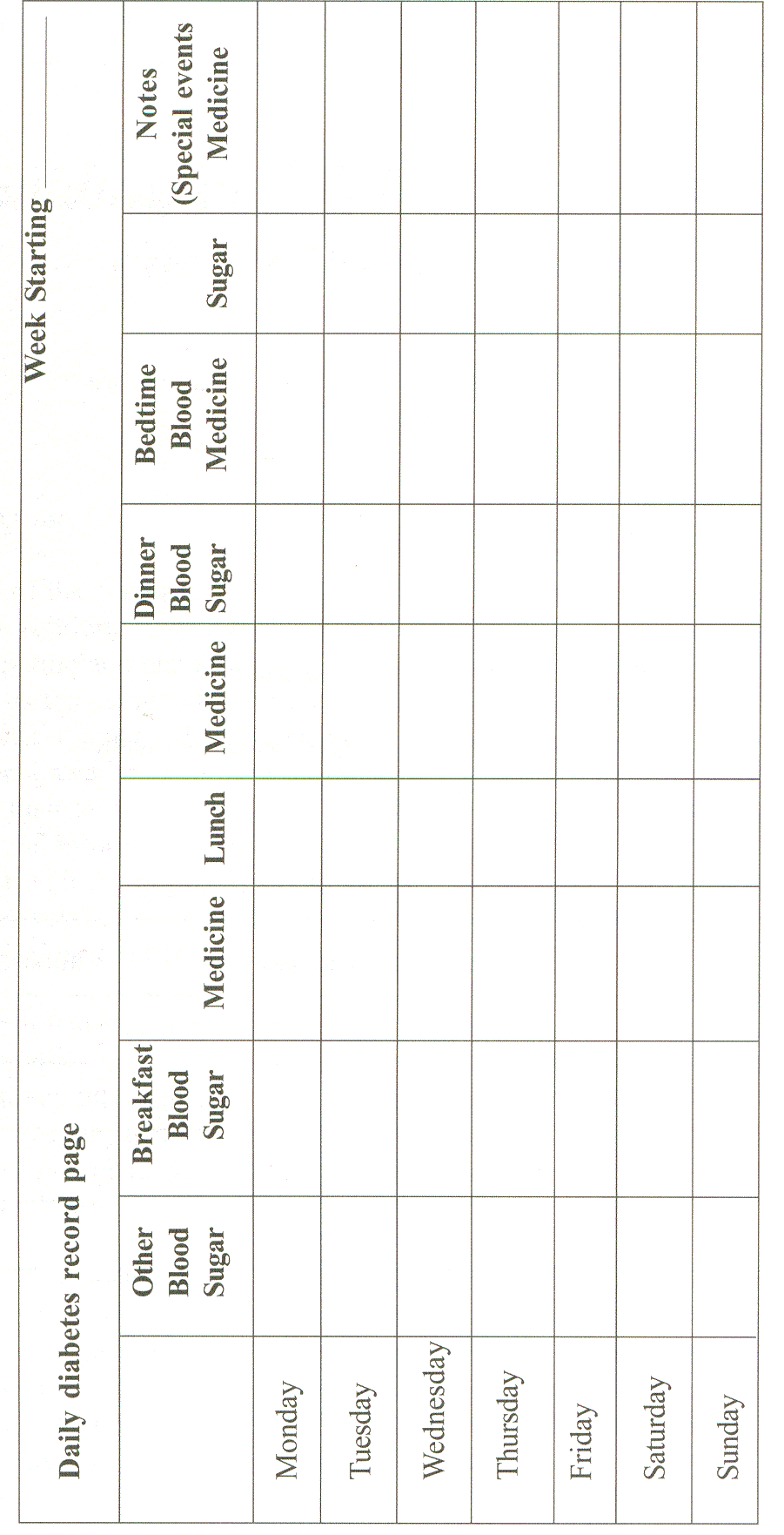
If needed, draw a line in the boxes under "Breakfast," "Lunch," and "Dinner" to make room for blood sugar check results before and after a meal, like this example:
Medicines
Under the heading marked "Medicine," write the name of your diabetes medicine and the amount taken.
Notes
Write down things that affect your blood sugar level. Some examples are
|
Eating more or less than usual. | |
|
Forgetting to take your diabetes medicine. | |
|
Exercising (write down what kind and for how long). | |
|
Being sick or upset about something (being under stress). | |
|
Going to a social event or other special event, or being on vacation. |
My health-care provider team members
Print out this chart and record names, addresses, and phone numbers.
| Name and Address | Phone Number | |
| Doctor | ||
|
Diabetes Dietitian Educator |
||
|
Diabetes Nurse Educator |
||
| Eye Doctor | ||
|
Dentist |
||
| Foot Doctor | ||
|
Pharmacist |
||
|
Counselor |